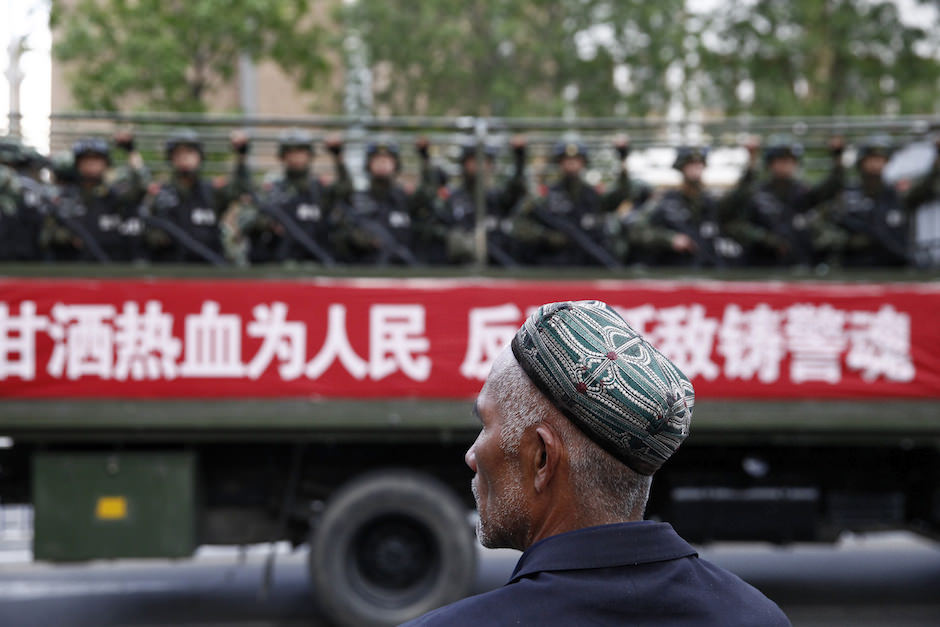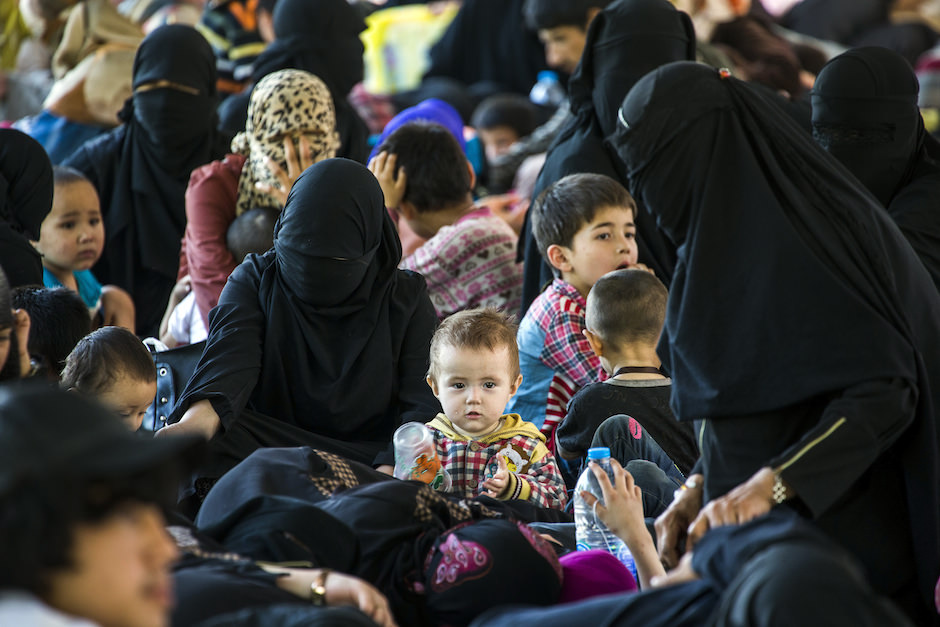It’s a very long way from China’s arid Xinjiang Uighur Autonomous Region in the country’s far northwest to its semi-tropical borders with Vietnam, Laos, and Burma in the south, and then it’s another precarious distance from there, down rivers and across fortified borders, all the way to the seaside Thai town of Songkhla, about forty miles from the Malaysian border. And it’s longer still from Songkhla to the battlefields of Syria, thousands of miles away. But this town is where more than two hundred members of the Uighur minority from Xinjiang—many of them women and children—were arrested by Thai authorities in March this year. They have been accused, apparently, of planning to wage jihad in Syria.
Among the many recent stories concerning foreigners setting out to fight in Syria, the allegations about the Uighurs arrested in Songkhla stand out. In fact, these people, along with another couple hundred recent Uighur escapees from China, most of them seized near the Thai-Cambodia border, signal something new in the movement of refugees around the world. China’s Uighurs, who now number some ten million and are concentrated in western China, are a mostly Muslim, Turkic-speaking people that has been increasingly restive under Chinese rule, The signs are that more and more of them, escorted by well-paid people smugglers, are making the long, arduous journey south, escaping what they say is harsh Chinese repression in Xinjiang. They are like other refugees in this sense, but with one major difference. The Uighurs arriving in southeast Asia have triggered a tense, mostly behind-the-scenes tug of war between China, which is pressuring Thailand to send the Uighurs back, and the West, including the United States, which has entreated the Thais to reject China’s demand, arguing that giving in to it would subject the Uighurs to savage mistreatment.
Most of the Uighurs who were detained in March are being held at a center run by Thailand’s Immigration Police near Songkhla, where they have been cordoned off from the rest of the world. The United Nations High Commissioner for Refugees has not been able to register them. Early on, Chinese officials got permission to visit some of them, but the detainees reportedly refused to talk, claiming that they were not Uighurs but Turks. My own requests to the Thai government to interview some of them, which I made during a trip to Thailand in July, went unanswered.
Xinjiang, the traditional Uighur homeland, making up one-sixth of China’s total area, has emerged as a kind of Muslim Tibet, an unstable territory in China’s deep interior. To Chinese leaders, Xinjiang may be even more worrisome than Tibet, since they clearly believe that its large Muslim population is susceptible to Islamic extremism that they claim is seeping in from neighboring Central Asia. And there has been serious violence. Since last fall about one hundred people are known to have died in Uighur-related violence, which China blames on what it refers to as “the three evils” of separatism, extremism, and terrorism. In March, eight knife-wielding Uighur men and women attacked commuters in the Kunming train station, far from Xinjiang, killing twenty-nine people. And in May, a group of Uighurs killed forty-three people in the Xinjiang capital of Urumqi when they drove explosives-laden SUVs into a morning market.
Amid such violence, the Chinese police have stepped up repressive measures. Last year, the heads of Xinjiang’s universities announced that only “politically qualified” students would be allowed to graduate, and instructed education authorities to exercise closer supervision of their students, including monitoring them during their vacations and making sure they don’t wear “religious clothing.” Meanwhile, numerous alleged troublemakers have been jailed. In May, for example, Xinjiang public security officials arrested 232 people for “dissemination of violent or terrorist videos.” China has also been enforcing its strict birth-control policies on Uighurs, who, if they live in cities, are subject to forced abortions if they try to have more than two children. At the same time, large-scale ethnic Han migration to Xinjiang has turned the Uighurs into minorities in many places.
Following the arrests of the Uighurs who turned up in Thailand, some Thai newspapers, citing Thai police officials, reported that they were jihadists seeking to go to Syria. No evidence has been presented to support this claim, which seems flimsy given that a substantial majority of the Uighurs are women and children, including a number of toddlers. Far more plausibly, they are families who were following the example of thousands of other Uighurs who have left Xinjiang in recent years.
The charge that they are Syria-bound terrorists comes straight from China’s Ministry of Propaganda. Several years ago, Chinese newspapers began reporting that some one hundred Uighurs had gone to Syria to join the jihadist rebellion there. This claim is dubious, given that hardly any Uighurs have been reported captured or killed or even observed in Syria, not even by the Syrian government. In July 2013, in what appears to be the only documented example of a Uighur fighting in Syria, the Chinese press reported on the case of one Memeti Aili, a twenty-three-year-old from Xinjiang who confessed that while he was a student in Turkey, he had been sent to Aleppo by a Uighur exile organization. In Aleppo, Aili said, he received seven days of training in weapons and bomb-making, which he was supposed to use when he came back to China. On September 1, according to The New York Times, the Iraqi Defense Ministry reported that it had captured a Chinese citizen fighting on behalf of the Islamic State in Syria and Iraq, but the man’s name, Bo Wang, and his appearance in photographs posted on the Iraqi Defense Ministry’s Facebook page suggest he is more likely to be a Han Chinese than a Uighur.
Advertisement
That doesn’t mean that there are no Uighurs among the jihadists from all over the world now fighting in the Middle East. Indeed, it seems likely, given Uighur anger in Xinjiang and the utter absence of peaceful avenues of protest, that some Uighurs may have embarked on the jihadist path. In March, a Reuters reporter talked by phone to Abdullah Mansour, who claimed to be the head of what he called the Turkestan Islamic Party. Mansour declared that fighting China was an “Islamic responsibility” and that there would be many more attacks in the future. And as European governments become increasingly alarmed by citizens from their own countries joining jihadist groups in Syria, perhaps to pose security threats when they return, Chinese allegations about Uighur extremism may seem more plausible.
But were any of the Uighurs arrested in Thailand this spring really headed to Syria? And, perhaps more important, if China has already told the Thais that some of the people in the Immigration Police lockup are jihadists, how fair a trial are they likely to get if they are returned to China? At the time the Uighurs in Thailand were captured, the Chinese government demanded that Thai authorities extradite all of them. The American ambassador in Thailand, Kristie Kenney, along with the ambassadors of several European countries, urged the Thais to resist the Chinese pressure. Meanwhile, the Turkish embassy said that it was willing to give the entire group asylum in Turkey. In the weeks since, according to diplomats in Thailand, the Chinese have reduced their demands, telling the Thais that they now want only about thirty of the Uighurs whom they had identified as criminals. The Thais have asked the Chinese for evidence to support their allegations, and that’s where matters stand. But some people who have followed this issue in Bangkok have told me that a sort of compromise is likely: as a gesture to its big and powerful neighbor, Thailand may agree to repatriate a few of the Uighurs, while allowing most of them to move on to Turkey.
According to human rights organizations, this would be both morally and legally unacceptable. Thailand belongs to various international conventions, including the Convention Against Torture, which bans the forcible return of any persons to any country where they would be likely to face persecution or torture, and a prima facie case could be made that that is exactly what the Uighurs now in Thailand would face if they were forced to return. There is an ample record showing that, at the very least, Uighurs repatriated to China in recent years have essentially disappeared into the maw of the Chinese public security system, even though China, while pressing for their return, had promised transparency in their treatment.
In 2009, for example, Cambodia, acceding to a Chinese demand, forcibly repatriated twenty Uighurs who had taken refuge there. Radio Free Asia (RFA), which maintains a network of Uighur reporters in Xinjiang and has probably the most extensive coverage of the region, reported that two of them were sentenced to life in prison after secret trials, another to seventeen years. The other fifteen are believed to be in Chinese custody, but their whereabouts are unknown. In 2011, Malaysia sent eleven Uighurs, all claimants to political asylum who had registered with UNHCR, to China. According to RFA, all of them were imprisoned. “It’s really not that complicated,” Brad Adams, the Asia director for Human Rights Watch, has said. “Returning Uighurs to China exposes them to severe abuse.”
Thailand and other countries in Southeast Asia thus face a dilemma. They would probably prefer not to submit to Chinese pressure. On the other hand, they don’t want to encourage more Uighurs to come, though the signs are that they are now coming in ever-larger numbers. The Cambodia Daily reported in late April that, after avoiding Cambodia for several years, Uighurs have once again begun passing through the country on their way to Thailand, despite warnings from Cambodian officials that both the refugees and those who help them will be treated as criminals. That same month, some sixteen Uighurs were arrested by Vietnamese police after a gun battle in which several people on both sides were killed. RFA has reported that the Uighurs who carried out the bloody train-station assault in Kunming were actually trying to flee across the border to the south, and that they carried out their attack when they were unable to do so.
Advertisement
Some of the captured Uighurs have been found with substantial amounts of cash on them. No information is available on where this money came from, though it seems entirely possible that some Uighurs have managed to save considerable sums, perhaps through trade, whether legal or not, or perhaps via a pooling of resources. Whatever its provenance, the cash may explain how they have been able to make their journeys—they have the money to pay smugglers and to bribe border police. There is very little information on what routes they take, but the Shan Herald, a multilingual Burmese news service, recently cited the testimony of what it called an “informed source” in northern Thailand, near where the borders of Thailand, Myanmar, and Laos come together. According to this source, the Uighurs, or some of them, make their way to southern Yunnan province, and then take boats on the Mekong River, which forms the border between Burma and Laos. “They get off the boats when they are approaching a checkpoint,” the source said, “and, conducted by a guide, will skirt it on foot, then climb back into their boats when they get to a safe distance.”
However the refugees now stranded in Thailand made their way out of China, their experience so far demonstrates that the Uighur escape route via Southeast Asia is, both politically and geographically, a very precarious one.
Reporting for this article was supported by a grant from the Pulitzer Center on Crisis Reporting.




